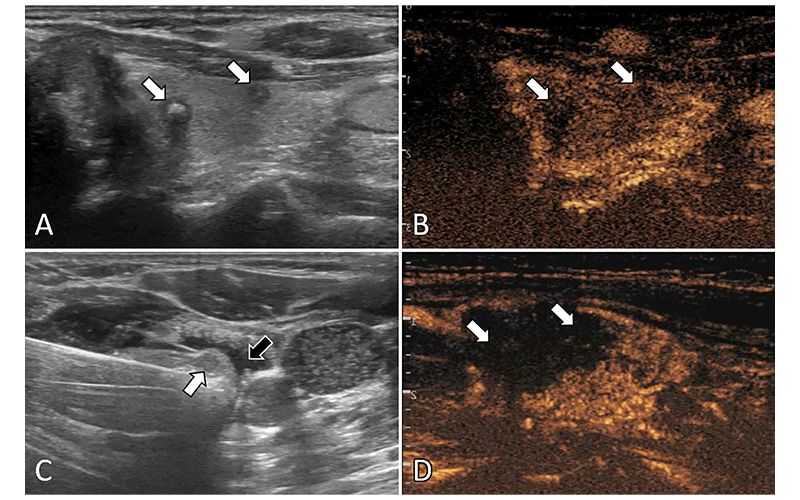Minimally Invasive Procedure May Spare Patients from Thyroid Surgery
Ablation technique offers progression-free survival rates similar to surgical resection

In a 10-center study, microwave ablation offered progression free survival rates and fewer complications than surgery in the treatment of a form of thyroid cancer known as papillary thyroid carcinoma (PTC), according to research published in Radiology.
The most common type of thyroid cancer, PTC often presents with multifocality, with a frequency ranging between approximately 23.5% and 60%.
Multifocal PTC is often treated with surgical resection, yet thyroid surgery is not without side effects. It can impact the patient’s quality of life due to factors like scarring, the necessity of lifelong hormone replacement and potential complications, such as permanent hoarseness or impaired thyroid function.
Microwave ablation is under preliminary investigation and could be a viable alternative to surgery for some patients.
“This study marks the first multicenter comparative analysis between microwave ablation and surgical resection for multifocal papillary thyroid cancer,” said senior author Ming-An Yu, MD, director of interventional medicine at China-Japan Friendship Hospital in Beijing. “These findings challenge traditional treatment paradigms and open new avenues for less invasive management strategies.”
Researchers looked at 775 patients with US-detected multifocal Stage I PTC treated with either microwave ablation or surgery across 10 centers between May 2015 and December 2021. They performed propensity score matching, followed by comparisons between the two groups.
After propensity score matching, 229 patients in the microwave ablation group and 453 patients in the surgical resection group were followed for a median of 20 months (range 12-74 months) and 26 months (range 12-64 months), respectively.
Ultrasound (US) images in a 57-year-old female patient with multifocal papillary thyroid carcinoma (PTC). (A) Routine US scan shows two hypoechoic PTC nodules (arrows) in the left lobe. (B) Preablation contrast-enhanced US image shows hypoenhancement in the arterial phase (arrows). (C) Isolating fluid (black arrow) is used to protect the muscles beside the nodule (white arrow) during the ablation. (D) Postablation contrastenhanced US image shows no enhancement in the original tumor zone (arrows).
https://pubs.rsna.org/doi/10.1148/radiol.230459 © RSNA 2024
Fewer Complications, Preserved Thyroid Function
Microwave ablation was associated with similar progression-free survival rates to surgery (5-year: 77.2% vs. 83.1%) but with fewer complications and a greater potential for preserving thyroid function.
Microwave ablation resulted in less blood loss, shorter incision length, and shorter procedure and hospitalization durations. Permanent hoarseness (2.2%) and hypoparathyroidism (4.0%) were encountered only in the surgical resection group.
“Our study has shown that microwave ablation offers a promising treatment option for multifocal papillary thyroid cancer,” Dr. Yu said. “Additionally, microwave ablation is associated with fewer complications and can preserve thyroid function, thereby enhancing patients’ quality of life. This represents a significant advancement in the field of interventional thyroid cancer treatment.”
Dr. Yu notes that microwave ablation does not routinely include preventative ablation of lymph nodes. In surgical resection, preventative lymph node removal is a common practice. However, the results provide the first evidence that even without lymph node ablation, microwave ablation yielded comparable survival rates to surgical resection.
For More Information
Access the Radiology study, “Microwave Ablation versus Surgical Resection for US-detected Multifocal T1N0M0 Papillary Thyroid Carcinoma,” and the related editorial, “Slow Growth, Excellent Prognosis: The Treatment and Overtreatment of Papillary Thyroid Cancer.”
Read previous RSNA News stories about interventional radiology: